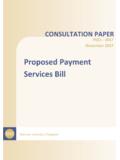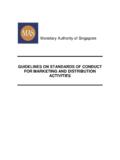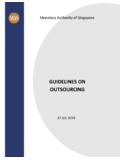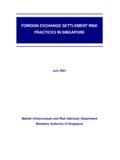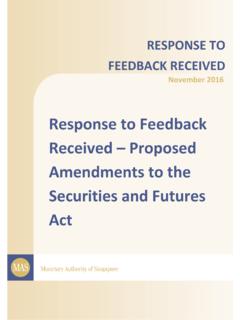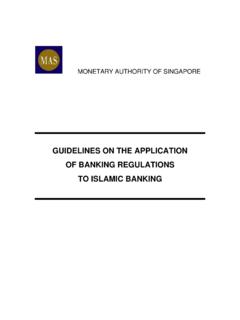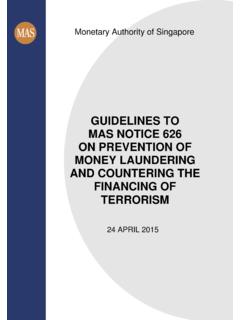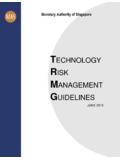Transcription of FINANCIAL ADVISERS ACT (CAP. 110)
1 Monetary Authority of Singapore FINANCIAL ADVISERS ACT (CAP. 110) GUIDELINES ON FAIR DEALING BOARD AND SENIOR MANAGEMENT RESPONSIBILITIES FOR DELIVERING FAIR DEALING OUTCOMES TO CUSTOMERS TABLE OF CONTENTS Introduction 1 1 Fair Dealing Outcome 1: Customers have confidence that they deal with FINANCIAL institutions where fair dealing is central to the corporate culture. Rationale Devising a clear strategy to achieve the fair dealing outcomes Aligning organisational policies and practices to the fair dealing outcomes Communicating the fair dealing outcomes as a priority for the FINANCIAL institution Monitoring implementation of the fair dealing strategy Key issues for self-assessment 5 5 5 6 8 8 9 2 Fair Dealing Outcome 2: FINANCIAL institutions offer products and services that are suitable for their target customer segments.
2 Rationale Conducting product due diligence Marketing to target customer segments Key issues for self-assessment 10 10 10 12 14 3 Fair Dealing Outcome 3: FINANCIAL institutions have competent representatives who provide customers with quality advice and appropriate recommendations. Rationale Ensuring competency of representatives Providing quality advice and appropriate recommendations Aligning remuneration structures with customers interest Key issues for self-assessment 15 15 15 17 21 23 4 Fair Dealing Outcome 4: Customers receive clear, relevant and timely information to make informed FINANCIAL decisions. Rationale Providing clear information Providing relevant information Providing timely information Key issues for self-assessment 24 24 24 26 28 29 5 Fair Dealing Outcome 5: FINANCIAL institutions handle customer complaints in an independent, effective and prompt manner.
3 Rationale Handling complaints independently and effectively Resolving complaints promptly Key issues for self-assessment 30 30 30 31 32 Guideline No : FAA-G11 Issue Date : 3 April 2009 (Last revised on 20 February 2013) GUIDELINES ON FAIR DEALING - BOARD AND SENIOR MANAGEMENT RESPONSIBILITIES FOR DELIVERING FAIR DEALING OUTCOMES TO CUSTOMERS INTRODUCTION 1 The Monetary Authority of Singapore [ MAS ] has issued the Guidelines on Fair Dealing - Board and Senior Management Responsibilities for Delivering Fair Dealing Outcomes to Customers [ the Guidelines ] to promote fair dealing by FINANCIAL institutions when they conduct business with their customers. The Guidelines incorporate public comments, lessons from the recent FINANCIAL crisis and MAS draft proposals from the Consultation Paper on Review of the Regulatory Regime Governing the Sale and Marketing of Unlisted Investment Products issued on 12 March 2009.
4 2 The Guidelines focus on Board and Senior Management responsibilities for delivering fair dealing outcomes to customers. The Guidelines apply to the selection, marketing and distribution of investment products and the provision of advice for these products. The Guidelines also cover responsibilities for after-sales services and complaints handling. While the Guidelines have been written with retail customers and investment products in mind, FINANCIAL institutions are strongly encouraged to apply the principles in the Guidelines to other customers and products. 3 The Guidelines set out five fair dealing outcomes and explain why each outcome is important.
5 They also list key issues, provide illustrations of good and poor practices, and set out self-assessment questions for the Board and Senior Management. Guidelines on Fair Dealing Board and Senior Management Responsibilities for Delivering Fair Dealing Outcomes to Customers 2 4 The five fair dealing outcomes are: Outcome 1: Customers have confidence that they deal with FINANCIAL institutions where fair dealing is central to the corporate culture. Outcome 2: FINANCIAL institutions offer products and services that are suitable for their target customer segments.
6 Outcome 3: FINANCIAL institutions have competent representatives who provide customers with quality advice and appropriate recommendations. Outcome 4: Customers receive clear, relevant and timely information to make informed FINANCIAL decisions. Outcome 5: FINANCIAL institutions handle customer complaints in an independent, effective and prompt manner. 5 The Board is responsible for charting the corporate policy and strategy to deliver the fair dealing outcomes to customers. The Board oversees Senior Management in implementing the corporate policy and strategy approved by the Board. The Board and Senior Management are accountable for setting the culture and direction of the FINANCIAL institution to align business practices with the fair dealing outcomes.
7 This involves influencing attitudes and behaviour of staff at all levels of the FINANCIAL institution, and requires concerted and wide ranging measures, in particular: a) demonstrated commitment by the Board and Senior Management to the fair dealing outcomes; b) a management information framework to measure and monitor achievement of the fair dealing outcomes; c) training for staff and representatives so that they have the skills and competencies to deal with customers fairly; and d) a performance evaluation and remuneration system to incentivise fair dealing conduct. 6 The Board and Senior Management of a FINANCIAL institution should review the overall business model of the FINANCIAL institution to ensure that it is consistent with dealing fairly with its customers.
8 In particular, the FINANCIAL Guidelines on Fair Dealing Board and Senior Management Responsibilities for Delivering Fair Dealing Outcomes to Customers 3 institution should review any business model that relies primarily on commissions and short-term product sales targets. The Board and Senior Management should pay attention to potential conflicts between the interests of the FINANCIAL institution and those of its customers, especially where the FINANCIAL institution is engaged in multiple business activities. 7 The emphasis on outcomes is deliberate.
9 Customers are concerned about their experiences when dealing with FINANCIAL institutions, and whether the investment products and services they buy provide real value. The five outcomes provide clear benchmarks for MAS and the industry to assess the performance and success of FINANCIAL institutions in promoting good market conduct practices. 8 The Guidelines should be read with the FINANCIAL ADVISERS Act, its subsidiary legislation, written directions, notices, codes and other guidelines. Each FINANCIAL institution needs to consider how best to apply the Guidelines to suit its business model and customer base. The Board and Senior Management of each FINANCIAL institution should be able to demonstrate that its strategy, policies, systems and processes support the fair dealing outcomes.
10 9 MAS will take into account a FINANCIAL institution s ability or failure to observe the Guidelines in assessing whether it continues to be fit and proper to conduct regulated activities. Where the failings relate to obligations under the relevant legislation, MAS will take supervisory or enforcement action. MAS will use inspections and visits to FINANCIAL institutions, interviews with the Board and Senior Management, surveys of FINANCIAL institutions, customer surveys and mystery shopping exercises to assess whether FINANCIAL institutions are observing the Guidelines. 10 Industry and consumer associations play a key role in promoting the fair dealing outcomes.
